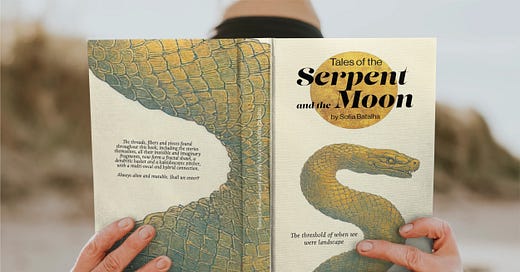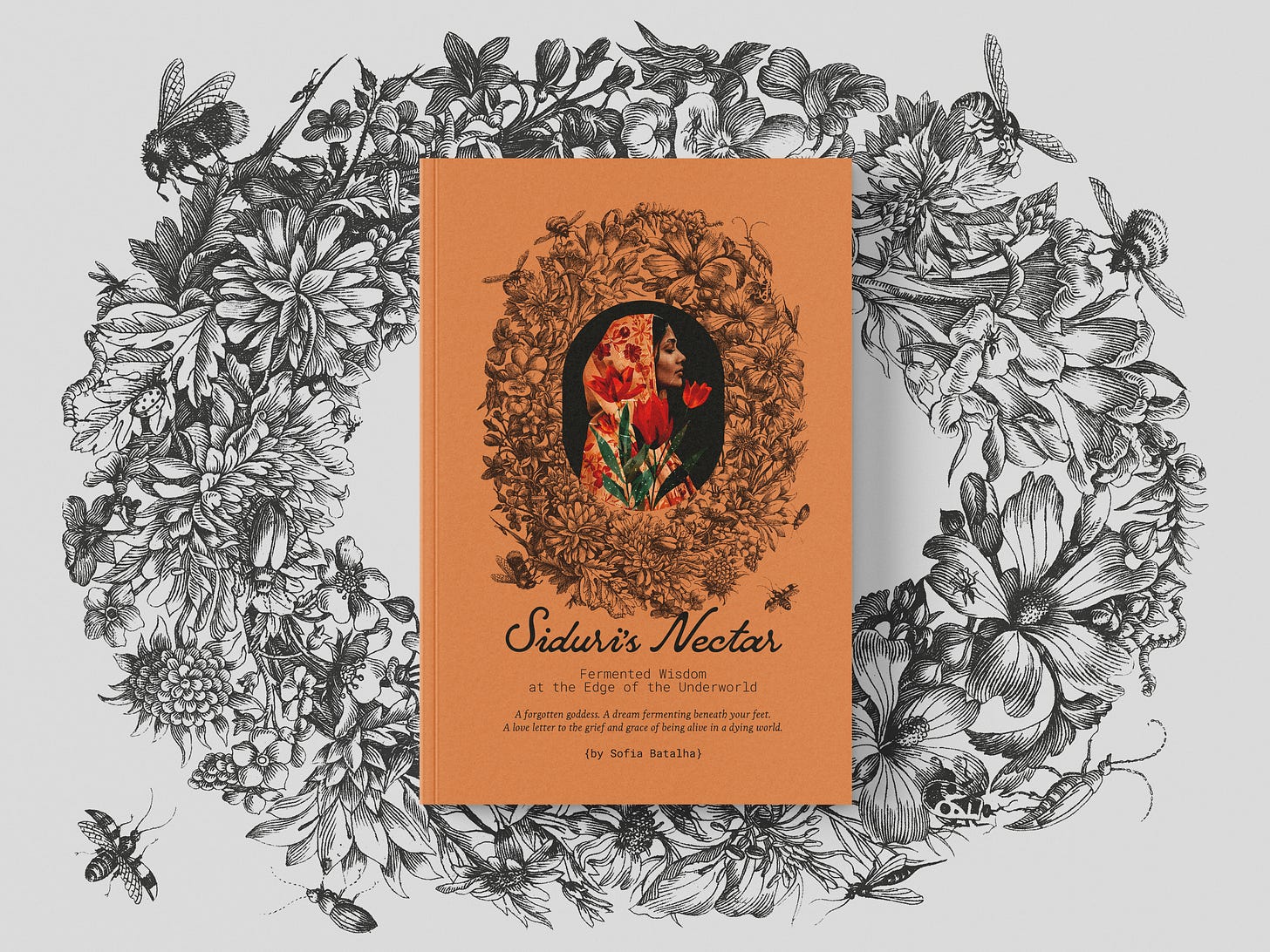A mythopoetic invitation into the wild, sensual, and eco-mythological realms of the Iberian landscape. Through ancestral stories and relational practices, Tales of the Serpent and the Moon helps us compost cultural forgetting into soulful remembering, where serpents speak, grandmothers return, and the Moon listens. This is not a manual, but a shawl of meaning woven for our troubled times.
After nearly a year of deep listening, re-translation, careful stitching, and mythic updating, I’m humbled and delighted to share with you the English edition of
Tales of the Serpent and the Moon.
This book is not a product. It is a living shawl, woven from soil-scented myths, bone-deep dreams, forgotten folk fragments, swampy whispers, and the slow murmur of serpents beneath your skin. These eight tales emerged from the mudbanks of rivers, from the silent screams of broken cosmologies, from ancestral echoes that refused to stay quiet. You will not find a linear path, a clear map, or a promise of resolution.
What you will find are portals, threads, shards, symbols to touch, to taste, to ask questions with. Invitations to dwell in the in-between. To listen again. To remember as radical reconnection.
This book carries no fantasies of a pure past, no escape hatch. Instead, it offers a slow, ecological intimacy with story, symbol, and land. It is a compost pile of mythopoetic resilience, of tender reckoning, of serpentine memory.
If you are willing to sit at the edge of what cannot be named, where myths still breathe, and the Moon still listens, this book is for you.
The threads, fibers, and pieces found throughout this book, including the stories themselves, all their invisible and imaginary fragments, now form a fractal shawl, a dendritic basket, and a kaleidoscopic pitcher, with a multi-vocal and hybrid connection. Always alive and mutable. Shall we enter? Come. Stir the cauldron. Let the stories speak. Let the soil remember.
Praise for the Tales of the Serpent and the Moon (from the Portuguese version)
“Reading these tales was a complete journey into our ancestry, collective subconscious and the earth. They made me dream so much because they unearthed so many symbols that my nights became even more alive. Sofia's ability to bring this symbolic information to words and to take each word to the memory of our bones is admirable!”
“This book takes me back to silence—an ancient silence, from the time of the most remote stones in these landscapes. Stories, mythologies, are not simply “told”. They are guardians of times and seasons, of cultures and the sacred. They are guides and spirits of the place itself. There is no character in a story who is not, at the same time, an identity coming from that place of the Soul of the world, the Others, the Ancients, the non-humans (even though they may be human).”
“Sofia's stories are stories from our psyche. I felt them on my skin, like an ancestral resonance that echoed in my pores. I was reading them for the first time, but I knew them as well as their cauldrons, shawls, masks, saws, and stones. It's a book that goes to the so-called memory of the bones, with all the rawness, beauty, and relentlessness of a good mythical narrative.”
“This book Remembers us, like a weaving from the Feminine Soul. With astonishment and acceptance, silences and pauses to integrate wisdom that belong to us, but which have never crossed our minds, so old they are. Imagination has never resided only inside our heads, but throughout the body, in a deep dialog and relationship with the entire cosmos.”
“This book surprised me. This book takes us on a journey through the tales that Sofia Batalha has created, but also through the tales that live inside us and want to be told. In fact, that's exactly what the author challenges us to do. It's very well written and also delightfully illustrated by Carolina Mandrágora. Take a look inside and if you like it, dare to enter.”
“I highly recommend reading this book, which is deeply rooted in Portuguese tradition, giving flesh to fictionalized myths so vital that they seem to have existed for a long time (and indeed they have). Here, myths, ancestry, memory, mystery and magic are the roots of identity, power and sovereignty, true Ariadne's threads for the core of Portuguese culture, but also for the territory and the spirit, from a perspective stripped of patriarchal logic, with female protagonists. Stories are an element of personal and collective construction. In this sense, one of the proposals in this book is the idea that myths and stories are central to promoting ecology. For me, the connection is obvious. Just as the Native American movements rely on their myths to protect their territory from capitalist greed, we can do the same here in Europe. Given the hegemony of rational and materialistic thinking here, there is a lot to be done to integrate another type of thinking. This book by Sofia Batalha is an important contribution in this direction. It's a privilege to read you!”
“In her short story O Manto Vermelho (The Red Cloak), Sofia Batalha presents us with an imaginary and mythical recreation of the fable, drawing on archaic elements and ancient, shamanic and sacred practices practiced in the Iberian Peninsula in times gone by. She goes to great lengths to investigate these practices (and in the book Tales of the Serpent and the Moon, she even reserves a separate chapter at the end of each tale where she unveils the symbolism associated with each element). Her ideas are profound, but flow effortlessly. The Red Cloak invites us to be what we are not (yet). Enchanting writing, a glimpse of what could be…”
“One of the last books I read. It's in Portuguese. I haven't read anything in this language for almost 5 years. It's like the beat of the drum coming from the depths, and we walk towards the sound, into the forest, drink from the sacred spring and are transported to the depths of the earth, to the womb of the Great Serpent Mother-Goddess. A source of inspiration to increase our efforts to create symbiotic relationships with the ancient spirits of the earth; those who guard ancestral knowledge. The guardians of the timeless whispers that echo the voices of generations.”
“I've come to share the extraordinary work of recovering stories as a matrix of personal, collective and systemic construction presented by Sofia Batalha in her book, which is as much about research at a top academic level as it is about the enchanting beauty typical of fairy tales. Well worth a read.”
“This is one of those books that looks like a pandora's box! First, it offers us tales that enter our imagination, until we lose ourselves in a new world created and nurtured by the author, as well as by the imaginative potential of each reader. Then this book takes us to the technical-scientific-telluric-tonic-creative knowledge that makes us vibrate, recognize and learn about the power of Tales. For me, as the author of a book of Tales, it brought me external validation and a feeling of empowerment and recognition. For the first time I was able to give name and form to how I felt about my book and my new way of writing. It made me feel magical, having been lucky enough to access universal, feminine, human wisdom. Thank you Sofia Batalha for such an excellent teaching and for recognizing Immanence and rescuing the wisdom of the elements and guardians of the Earth.”
Positionality Statement
These works emerge as offerings from a body situated in specific inheritances, as a white, able-bodied, cisgender woman from the Iberian Peninsula, shaped by the layered sediments of Global North modernity and its colonial, patriarchal, and extractive logics. I do not speak from nowhere, nor do I offer these texts as universal claims or authoritative knowledge. I’m definitely not a specialist nor a prophet (lol). I’m just curious, on the spectrum of cynicism. I’m a humble listener and weaver, remembering and engaging with what pulses beneath and beyond my own cultural training.
The stories, dreams, and research that animate The Sanctuary, Siduri’s Nectar, and Tales of the Serpent and the Moon are not presented as retrievals of some untouched indigenous purity, that would only replicate the violence of romanticization. Instead, they move with the cracks and fractures of severed lineages, fragments, and shards that remain accessible through dreams, rituals, myths, ruins, and the metabolic grief of historical disconnection. They are invitations to compost what I carry in my body, both the privileges and the losses of being entangled within European modernity’s severances from land, kin, and cyclical relationality.
In this sense, the Iberian Peninsula offers not only geography but also a dense matrix of eco-mythological echoes, pre-agrarian cosmologies, animist threads, matrilineal knowledges, and seasonal wisdoms that were violently subjugated over millennia. The narratives I engage with attempt to honor these submerged voices without claiming ownership over them. They seek neither to appropriate nor to restore, but to move alongside, humbly entering conversation with what still lives in the bones of the land, in the layered griefs, and in the silent singing of stones, rivers, and old trees.
This is not a project of escapism nor a solution-making endeavor. It does not aim to heal the trauma of modernity through simplistic repair. I sit with complexity, paradox, and grief, the anguish of extinction, domestication, severance, and assimilation. I write from within modernity’s habitat, attempting to loosen its structure, making space for relational repair and remembrance. I stand on the cracked ground of Iberian histories that still whisper through enchanted tales, bone memories, and ancestral landscapes.
May these texts serve not as finished blueprints, but as offerings for others who are also navigating the intricate, painful, and necessary work of relational re-membering. A fierce and gentle work that refuses extraction, superiority, or purity, and instead roots itself in accountability, complexity, and reciprocal belonging.
I’m working to make all posts open to everyone. Paid subscriptions help support the depth of this research, allowing these narratives to continue gestating outside institutional and market demands. You’re invited to support if you feel called, but your presence here, as a living witness, is already part of the story.
Honor hystera. Re-member. Response-ability. (Un)learn together.







Can't believe I see this right after I hop in to check what I've missed from you these last few weeks Sofia. The serpent is coming up so strongly for me these days. The cover looks gorgeous! Can't wait to get my hands on the book.
Will the book become available in UK soon Sophia?